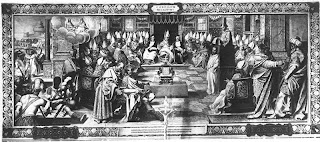A few months ago, I was asked to draft a constitution for a new church for a group of people who had left a Baptist church. The constitution had the following provisions as checks and balances:
- The Elders were to be elected by the Congregation.
- One third of the Elders were to retire each year but they could put their names forward for re-election. This gave opportunity for fresh blood to be introduced but also gave Elders a reason to pause and reflect if they still had God's mandate for them to continue.
- The Elders were responsible for annually reviewing the performance of the Minister.
- The Minister was responsible for submitting an annual plan and budget for approval before the Elders.
- Major Transactions: Any financial commitment valued at greater than half of the church's total assets or $100,000 (which ever was the lesser) would require an ordinary resolution at a Members' meeting.
- The Elders were required to report back to the Congregation and to hold a forum to discuss the church's business every six months. Once at the Annual General Meeting and six months later at a Business Meeting.
- The Elders will be appointed by the Minister.
- Their position as Elders will be for life and their tenure may only cease if they bring the church into disrepute, resign or die.
- The Minister's relationship with the church is not one of employment but does not go on to define it further.
- The requirement for an annual plan or budget was removed.
- The requirement for member approval for major transactions was removed.
- Business meetings could be requested by the congregation but must have the Elders' unanimous approval.
- Special General Meetings could also be requested but must also have the Elders' unanimous approval.
Since they had recently worshipped at a Baptist church I assumed that voting would be an accepted practice amongst them. After reading the first draft, I was surprised that the new minister was strongly opposed to voting for Elders. I pointed out that the Greek word for "appoint" used in Acts, in the context of selecting Elders, was "Cheirotoneo" (G5500) could be translated as "a show of hands". Interestingly, I notice that in the ESV, Cheirotoneo is the only word translated as "appointed" in connection to Elders. He looked it up and said he felt it could be construed as a "laying on of hands." Plato had used the word in the context of selecting Senators for the Athenian Parliament, and it would be difficult to imagine that they would tolerate anything but a vote. He replied that "God has gathered these people around me, and I will not allow anything that will put my ministry at risk. I'm not happy."
Being a new church, I said the new members might be unfamiliar with each other, so interim Elders could be selected and then elections could be held, say, six months later. I spoke with another church member, who would later become one of the Elders about the matter and his reply was "we have been together for some weeks now, before you came along. If you do not like the way it is, then you don't have to come."
At the next church meeting, he proceeded to announce his selection of Elders based on "what God had told him."
Afterwards I approached one of the elders and advised him now that an eldership had been selected, it was appropriate for me to end my involvement in the development of the constitution.
Later I had the opportunity to review the final constitution and I see that they retained about half the text of the original document. However when it came to the checks and balances they replaced the before mentioned provisions with:
Its interesting to note that Berakhot 55a, based on Exodus 35.30, also teaches that the consent of the governed is required in selecting communal leadership.
There is, however, another aspect which modernity assigns to legitimate leadership, particularly in Western democracies -- that is, leaders can only govern with the consent of the governed. This very principle is found in the Talmud:
"Rabbi Issac said: 'We do not appoint a communal leader unless the community is consulted,' as it is said, 'See the Lord has called by name, Betzalel.' (Exo 35.30) The Holy One said to Moses: 'Moses is Betzalel acceptable to you?' Moses said: 'Master of the Universe, if he is acceptable to You, he is certainly acceptable to me.' God said to Moses: 'Even so, go and ask them (i.e. Bnei Yisrael,... to get their consent)' Moses went and asked them: 'Is Betzalel acceptable to you?' They said to him, 'If he is acceptable to the Holy One and to you, he is acceptable to us.' (Berakhot 55a).
Obviously, the people's consent, if it is to be meaningful, must be both voluntary and knowing. Both Moses and Betzalel had to make full disclosure of their activities to obtain and maintain the people's consent -- even the approval of God is not sufficient. [Source: Goldrich, K S (2004). Parashat
Vayakhel-Pekudei Ha Hodesh.]
In the Mishnah, Peah 8.7, more than one person must handle public funds and distribution must be handled by a minimum of three. Yuma 38a suggests that transparency is a key factor in handling public funds and teaches that any appearance of impropriety should be avoided.
It is naive in the extreme to establish Christian churches and organisations without adequate provisions against the Evil Inclination.
Why is church governance relevant at all to the congregation, one may ask? Isn't it enough for the congregation to feel that they are being well shepherded and taught?

No comments:
Post a Comment